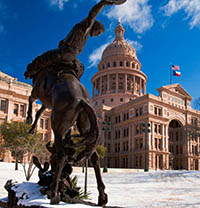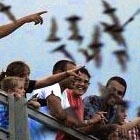Chapter Seven - The Years Before the War
Many of the historic events which I have witnessed have faded in my memory as the years have passed, and so I can only recall them in a general way. So, for example, I can only remember vaguely the day of January 9, 1905. I was not in service at the Winter Palace that Sunday. Crossing Nevsky Propect, I saw a procession being led by the priest Gapone, which was heading toward the Winter Palace. It was being followed by a huge crowd. This procession, though, was driven by a fundemental misunderstanding, given that the demonstrators were anxious to see the Emperor, who was not at the Winter Palace that day, but rather at Tsarskoe Selo. The horseguards were sent out against the demonstrators, but only after being proceeded by long calls for calm and order, and being ordered to disperse. However, it was Gapone, cross in hand, who was excited.
The calls to order were not calming the crowd, and so a blank shot was fired in the air. When the procession continued to advance, they fired into the crowd to disperse them, leaving many killed and wounded on the square and sidewalks.
During the course of that busy year, I had seen Count Witte many times. He simply crushed everyone with his obesity. Of huge size, he was noted for the slowness of his movements and calmess of his character. To mention Witte is to mention the manifesto of October 17 (Old Style), 1905 on "liberties". He wrote it - and over a fairly long time - at Peterhof. Many people close to the Emperor helped Count Freedericks at those meetings and added many corrections to the Manifesto, even aide-de-camp Vladimir N. Orlov (who was later disgraced, despite his friendship with the Emperor, because of his hostility towards Rasputin) attached in the suite to Grand Duke Nicholas Nicholaievich in the Caucasus. He should not be confused with the other Orlov, Alexander A., of the Uhlans of the Guard, known for his cruelty in putting down the revolt in the Baltic provinces in 1905.
The preparation of the Manifesto ran its full course during the conspiracy. Once the text was adopted, the Emperor read it closely, made the sign of the Cross, and put his signature to it.
I did not attend the First Opening of the Duma of the Empire. I have no memory at all of the first members of the Duma. I do remember very well the arrival of S.A. Murometziev, the first President of the Duma, along with the delegation of the Duma, and the beginning of its existence. At that time, I most particularly noticed Murometziev's personality. Moreover, it seemed strange to us to see the modest dress of the deputies of the Duma, given our being used to the brightness of the Military and Court costumes.
I remember seeing Stolypin for the first time that same year. This happened in the waters off Finland on board the Imperial Yacht "Standart" when Stolypin came to present his report to the Emperor.
I was in service that day, and I could see the presentation of Stolypin to those persons in the Emperor's suite.
After his report and audience with the Emperor, Stolypin went into the Dining Salon, where there was a table laid with zakhuskie, and where the officers of the suite were hurrying to await the Emperor's arrival. Count Freedericks and the Minister of the Navy were also there. The moment Stolypin appeared, every eye was fixed on him. Large, of handsome appearance and presence, he calmly stopped in the middle of the Dining salon and looked at the group of men of the Court. After a moment's hesitation, Freedericks approached him and presented all of the dishes of the zakhuskie, one after the other. Clearly Stolypin's strong personality had made a profound impression at once.
Several minutes later the Emperor and Empress entered and went to the table. Stolypin was seated next to the Empress and their conversation was lively throughout the entire meal. Conversation was, mostly, confined between the Imperial Couple and the Prime Minister.
I often had the occassion to see Stolypin with the Emperor and Empress. I must add, however, that despite the friendly reception which he always got in the Imperial Palace, there was never any real intimacy between the Imperial Family and him. Whenever he was with the Imperial Family, they would never have any personal relations with him.
Shortly after Stolypin's visit, Emperor Wilhelm II arrived in the Finnish waters for the famous meeting. Apparently he took the opportunity to make the acquaintance of the Minister, as General Count Tatichev (who was one of the most loyal dignitaries of the Court and never abandonded the Emperor, even following the Imperial Family into exile, and we went the farthest, he was assassinated at the same time as the Imperial Family) told me in the Suite that Wilhelm II had told him of his satisfaction at having met Stolypin. After an interview with Stolypin, Wilhelm II approached Tatichev and said "If I had such a Minister I could conquer all of Europe!" At the time of this meeting between the two Emperors, their personal relationship was notably friendly. Soon after the meeting, the Emperor left for Germany to attend the marriage of Wilhelm's only daughter, Princess Victoria-Louise.
At the end of summer 1911, the Emperor went to Kiev, and I accompanied him. Several colleagues and I slept in the Imperial train, and on September 1, suspecting nothing of course, I took a walk on the Krestchatik. Near the theater, we noticed, my companion and I, some disturbance. One of the Court's security agents explained the cause to us. To be safe, we reboarded our train.
The next day I attended the gala dinner and overheard the conversation between two generals I did not know, who spoke of the assassination the day before. After firing on Stolypin, Bogrov tried to run away. Two officials threw themselves on him and wanted to finish him off with their swords. They were stopped from doing so. When Bogrov was asked if he knew who he had killed, and whether he had meant to take the Emperor's life instead, he responded with a wave of his hand and said "It was all the same to me, I had to kill somebody."
Both the Kiev Okhrana Section Chief Kuliabko and his superior Adjutant Minister of the Interior Kurlov were accused not only of negligence, but also with "indirect participation, morally speaking, in the assassination of Stolypin, who was disliked in high places." This last accusation arose when the revolutionary Nathanson said in his Memoirs that Bogrov, being an Okhrana agent in Kiev, went to Petersburg to offer the Socialist Revolutionary Party his sevices to kill the Tsar. Nathanson did not follow up on his offer.
Stolypin's murder created genuine panic among the Jewish community of Kiev, who had just begun to live in the city. Bogrov, you see, was Jewish. The railroad station was filled with people trying to leave. Happily, their alarm was not founded in truth. The third day after the catastrophe, I myself heard the Emperor, saying goodbye to General Trepov, telling him most sternly that he (the Emperor) would not stand for any Pogrom against the Jews under any pretext, and the Emperor suggested to Trepov that he should use all of his forces to maintain absolute order in the city. As we know, the Emperor's order was followed to the letter.
From Kiev we went to Livadia.
In Autumn 1912 the centenary of the national war was celebrated. After cermonies in Moscow, the Emperor and his guests took a trip to Borodino.
After the inauguration there was a luncheon held in tents set up in the field, and they visited the graves and ancient fortifications. Many divine services were held for the repose of the souls. In the evening they met with the "veterans" who rembered the war of 1812.
One remarkeable old woman was asked by the Emperor:
"How old are you?
"One Hundred Ten" she answered.
"What do you know?" asked the Emperor.
"Go ask the Ouprava (the civil service) they can tell you down there" the old woman answered. To that the Emperor laughed heartily and was satisfied.
We stayed the entire day on the Borodino field, without the Empress. The Emperor was accompanied by some of his daughters. They dined on their train. Throughout the mean they heard popular singers singing for them outside.
Comments on this site should be directed to Bob Atchison.

